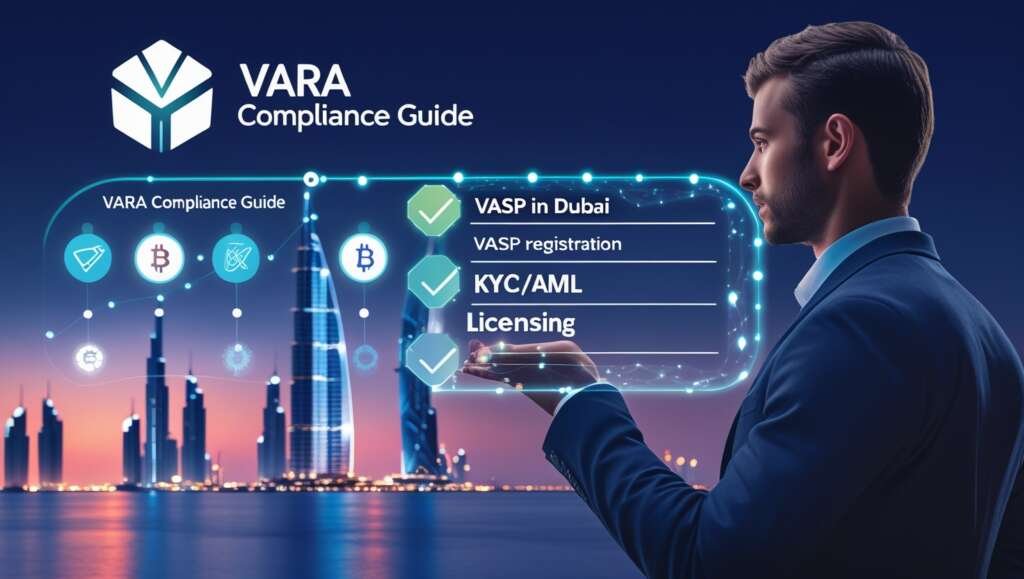Thinking of launching a crypto business in Dubai?
You’re not alone. The city has quickly become a magnet for Virtual Asset Service Providers (VASPs) from around the world—thanks to its business-friendly environment and cutting-edge digital asset regulations. But while the opportunities are massive, so are the expectations.
Enter VARA—the Virtual Assets Regulatory Authority—Dubai’s dedicated watchdog for the virtual asset space. If you want to operate legally and build trust with clients, understanding VARA’s compliance rules is non-negotiable.
Whether you’re running an exchange, offering OTC services, or managing crypto payments, this article simplifies everything you need to know about staying compliant—from AML requirements to governance standards, risk controls, and more.
Let’s break it all down—clearly and practically—so your business can grow with confidence in one of the world’s most promising crypto markets.
Mandatory VARA Licensing: The Gateway to Operation
The foremost and non-negotiable requirement for any VASP wishing to operate in or from Dubai is securing a VARA license. This isn’t a mere formality but a comprehensive gateway designed to ensure that only legitimate, well-structured, and compliant entities participate in the market. The scope of activities requiring a license is broad, encompassing various facets of the virtual asset lifecycle: whether you’re involved in operating an exchange for virtual assets, acting as a broker-dealer facilitating trades, providing custody services for digital assets, offering advisory services related to virtual assets, or facilitating transfer and settlement services – each requires explicit VARA approval.
The licensing process itself is rigorous, often involving a two-stage application: an initial Approval to Incorporate (ATI) followed by a full VASP License application. During this process, VARA scrutinizes every detail of your proposed operations, from your business model and technological infrastructure to your governance structure and financial projections. Without this essential license, a VASP is explicitly prohibited from conducting any virtual asset activities in Dubai. VARA has consistently demonstrated its willingness to take enforcement action, including significant fines and public warnings, against unlicensed entities, underscoring the zero-tolerance policy for non-compliance with this fundamental requirement. Obtaining a license signals to the market, partners, and customers that a VASP has met Dubai’s stringent regulatory standards, building an immediate layer of trust and credibility.
Robust AML and KYC Rules: Building a Foundation of Trust
At the heart of VARA’s regulatory framework lies an unwavering commitment to combating money laundering (AML) and the financing of terrorism (CFT). For VASPs, this translates into a mandatory set of comprehensive AML and Know Your Customer (KYC) rules. These aren’t just tick-box exercises; they require a proactive and risk-based approach to identifying, assessing, and mitigating financial crime risks.
Key components include developing and implementing robust internal AML policies and procedures tailored to the VASP’s specific activities and risk profile. This necessitates thorough KYC/ KYB checks on all clients, regardless of whether they are individuals or corporate entities. KYC processes must involve verifying customer identities, understanding the nature of their business or activities, and assessing their risk level. For higher-risk clients, such as Politically Exposed Persons (PEPs) or those from high-risk jurisdictions, Enhanced Due Diligence (EDD) procedures are mandatory, requiring deeper scrutiny into the source of wealth and funds. Furthermore, VASPs must implement sophisticated transaction monitoring systems capable of detecting unusual or suspicious patterns of activity in real-time. Any identified suspicious transactions must be promptly reported to the UAE’s Financial Intelligence Unit (FIU) via Suspicious Transaction Reports (STRs). Compliance with the FATF Travel Rule is also paramount, mandating that VASPs collect and transmit specific originator and beneficiary information for virtual asset transfers exceeding certain thresholds. These stringent AML/KYC requirements serve to protect the VASP from being exploited by illicit actors and underpin Dubai’s reputation as a secure and transparent financial hub.
Experienced Leadership: The Backbone of Compliance
VARA places significant emphasis on the quality and experience of a VASP’s leadership, particularly those in critical compliance and risk management roles. This ensures that the VASP is guided by individuals who possess the necessary expertise to navigate the complex regulatory landscape of virtual assets. A key requirement is the appointment of a qualified Compliance Officer, who must possess at least five years of relevant experience in financial services compliance, with a strong understanding of AML/CFT regulations.
In addition to the Compliance Officer, VASPs must designate specific individuals responsible for AML compliance (often the Money Laundering Reporting Officer or MLRO) and sanctions compliance. While these roles can potentially be combined, this is only permissible if the individual possesses the requisite qualifications and experience to effectively discharge all responsibilities without conflict of interest or undue burden. VARA’s “Fit and Proper” assessment for key personnel is rigorous, examining their integrity, competence, financial soundness, and prior experience. This emphasis on experienced leadership ensures that compliance is not just a departmental function but is embedded at the highest levels of the organization, driving a culture of regulatory adherence and responsible innovation.
Client Fund Protection: Safeguarding Digital Assets
Protecting client funds is a cornerstone of VARA’s regulatory philosophy, given the inherent risks associated with virtual assets such as hacking, fraud, and operational failures. VASPs acting as custodians or exchanges are particularly subject to stringent requirements designed to safeguard client assets. A fundamental principle is the mandatory segregation of client assets from the VASP’s own operational funds. This ensures that in the event of insolvency or other financial distress of the VASP, client funds are protected and can be returned to their rightful owners, minimizing contagion risk.
Beyond segregation, VARA mandates robust measures for securing virtual asset wallets, whether hot (online) or cold (offline) storage solutions. This includes the implementation of industry best practices for cryptographic key management, multi-signature protocols, hardware security modules (HSMs), and secure access controls to prevent unauthorized access. VASPs are also required to maintain comprehensive and accurate daily records of all client assets, transactions, and holdings, providing an auditable trail that ensures transparency and accountability. Regular reconciliation of client balances and robust internal controls are essential to prevent losses or fraud. Furthermore, VARA may require specific insurance coverage, such as commercial crime insurance, to protect against potential theft or loss of client assets, adding another layer of security and investor protection.
Good Governance: Ensuring Accountability and Oversight
Effective corporate governance is paramount for VASPs operating under VARA’s purview. The regulator expects a clear, well-defined organizational structure that promotes accountability, transparency, and effective oversight. This includes establishing a robust board of directors with clearly defined roles, responsibilities, and reporting lines. The board is expected to provide strategic direction, oversee risk management frameworks, and ensure the effective implementation of compliance policies.
VARA’s regulations prohibit the existence of “ghost” directors or opaque leadership structures. All individuals in senior management or governance roles must be explicitly identified, undergo “Fit and Proper” assessments, and demonstrate active involvement and understanding of the VASP’s operations and risks. A strong governance framework also encompasses the establishment of independent oversight functions, such as internal audit and risk management committees, to provide an unbiased review of the VASP’s operations and compliance posture. Clear policies on conflicts of interest, ethical code of conduct, and internal controls are also essential. This focus on strong governance aims to prevent mismanagement, operational failures, and the exploitation of the VASP for illicit purposes, fostering a culture of integrity from the top down.
Cybersecurity: A Non-Negotiable Priority
In the digital realm of virtual assets, robust cybersecurity is not merely a technical requirement but a fundamental aspect of operational resilience and client protection. VARA’s regulations impose stringent cybersecurity mandates on VASPs, recognizing the heightened risk of cyberattacks in this sector. VASPs must implement a comprehensive Technology Governance and Risk Assessment Framework that addresses all aspects of their systems and operations.
Key areas of focus include:
- Key Management: Secure generation, storage, and management of cryptographic keys and seed phrases, ensuring there is no single point of failure. This often involves multi-party computation (MPC) or multi-signature approaches.
- Wallet Security: Implementing industry best practices for both hot and cold wallet security, with stringent access controls and robust encryption.
- System and Network Security: Deploying advanced firewalls, intrusion detection/prevention systems, and ensuring regular vulnerability assessments and penetration testing by qualified independent third-party auditors.
- Breach Response: Developing and regularly testing a comprehensive incident response plan to effectively manage and mitigate the impact of cybersecurity incidents, including clear notification procedures to VARA and affected clients.
- Data Protection: Safeguarding client data through encryption, access controls, and adherence to data privacy regulations.
- Staff Training: Ensuring all staff are regularly trained on cybersecurity best practices and aware of potential threats like phishing and social engineering.
VARA mandates that cybersecurity policies are reviewed and updated at least annually by a Chief Information Security Officer (CISO) or equivalent, reflecting the constantly evolving threat landscape. The goal is to build a defense-in-depth strategy that protects against both external threats and internal vulnerabilities.
Honest and Clear Marketing: Protecting Consumers
To safeguard investors and maintain market integrity, VARA imposes strict regulations on the marketing, advertising, and promotion of virtual assets and VASP services. The core principle is transparency and truthfulness. VASPs are prohibited from making exaggerated claims about returns, guaranteeing profits, or hiding inherent risks associated with virtual assets.
All marketing materials, including websites, social media content, and advertisements, must be fair, clear, and not misleading. They must prominently display risk warnings, explaining the volatile nature of virtual assets and the potential for capital loss. VARA reviews all public-facing materials and can take action against VASPs that engage in deceptive or irresponsible marketing practices. This ensures that consumers are fully informed before engaging with virtual asset services, fostering a more responsible and trustworthy market environment.
Ongoing Compliance and Monitoring: A Continuous Commitment
Compliance with VARA’s regulations is not a one-time event tied to the license application; it is an ongoing, continuous commitment. VASPs are expected to embed a culture of compliance throughout their organization. This includes regularly reviewing and updating internal policies and procedures to reflect changes in regulations, market conditions, or the VASP’s operations.
Regular training for all staff members on AML/CFT, cybersecurity, and market conduct rules is mandatory to ensure a high level of awareness and competence. Furthermore, VASPs must be prepared for periodic audits by independent third parties and regular inspections or examinations by VARA itself. These oversight activities ensure that the VASP continues to meet regulatory standards post-licensing. Ongoing reporting requirements, including financial statements, operational statistics, and suspicious activity reports, provide VARA with the necessary data to monitor market activity and VASP adherence to rules. Any significant changes to the VASP’s business model, ownership, or key personnel must also be promptly reported to VARA. This continuous monitoring and reporting framework ensures dynamic oversight and responsiveness to emerging risks.
Capital and Financial Controls: Ensuring Stability
VARA requires VASPs to maintain adequate capital and robust financial controls to ensure their operational stability and capacity to absorb potential losses. The specific capital requirements vary depending on the type of virtual asset activity undertaken, with higher-risk services (like operating an exchange) typically requiring more capital. This paid-up capital requirement serves as a financial buffer, demonstrating the VASP’s solvency and commitment.
In addition to base capital, VASPs must maintain sufficient liquid assets to cover operational expenses and potential liabilities. This includes demonstrating sound financial management, effective budgeting, and transparent accounting practices. VARA’s requirements aim to prevent undercapitalization, which could jeopardize client funds or lead to systemic instability. Regular financial reporting to VARA is mandatory, allowing the regulator to continuously assess the VASP’s financial health and risk exposure. This financial prudence helps build investor confidence and ensures the long-term viability of licensed VASPs in the Dubai market.
Thorough Transaction Monitoring: Detecting Illicit Activity
Building on the AML/KYC requirements, VARA emphasizes the critical role of thorough transaction monitoring systems. VASPs must implement advanced technologies and processes capable of screening both incoming and outgoing virtual asset transactions and associated wallet addresses. This goes beyond simple identity verification and extends to analyzing transaction patterns, volumes, counterparties, and geographies for anomalies or red flags indicative of illicit activity.
The systems should be able to identify transactions with sanctioned entities, high-risk jurisdictions, or those linked to known illicit addresses (e.g., darknet markets, ransomware). Automated alerts and rules-based monitoring help flag suspicious transactions for further investigation by the VASP’s compliance team. Crucially, how VASPs respond to and report suspicious transactions must be clearly documented in their AML/CFT policies. This robust monitoring capability is vital for the early detection and reporting of financial crime, contributing significantly to Dubai’s efforts to maintain a clean and reputable virtual asset ecosystem.
Why VARA Compliance Matters
VARA’s comprehensive regulatory framework is not simply about imposing rules; it is a strategic initiative to position Dubai as a leading, trusted, and transparent global hub for virtual assets. By adhering to these stringent compliance requirements, VASPs gain immense benefits:
- Avoidance of Penalties: Strict compliance helps avoid hefty fines, license suspensions, and potential criminal charges for non-compliance.
- Enhanced Reputation: Operating under VARA’s license significantly boosts a VASP’s credibility and trustworthiness in the eyes of local and international investors, partners, and traditional financial institutions.
- Access to Traditional Finance: Compliance with robust AML/CFT and governance standards facilitates smoother relationships with banks and other financial institutions, which are often wary of the virtual asset space due to perceived risks.
- Investor Protection: By safeguarding client funds, ensuring transparent marketing, and implementing strong cybersecurity, VASPs contribute to a safer environment for consumers, fostering greater confidence and participation in the virtual asset market.
- Sustainable Growth: A compliant and well-governed business is inherently more resilient, capable of attracting investment, fostering innovation responsibly, and ensuring long-term sustainability in a rapidly evolving industry.
In conclusion, for any VASP serious about establishing a strong presence and achieving sustainable growth in Dubai’s burgeoning crypto scene, prioritizing VARA compliance is not just about fulfilling regulatory obligations. It’s about strategically building a robust, secure, and future-ready business that can confidently navigate the complexities of the virtual asset landscape while contributing to Dubai’s vision of becoming a global digital economy leader.




